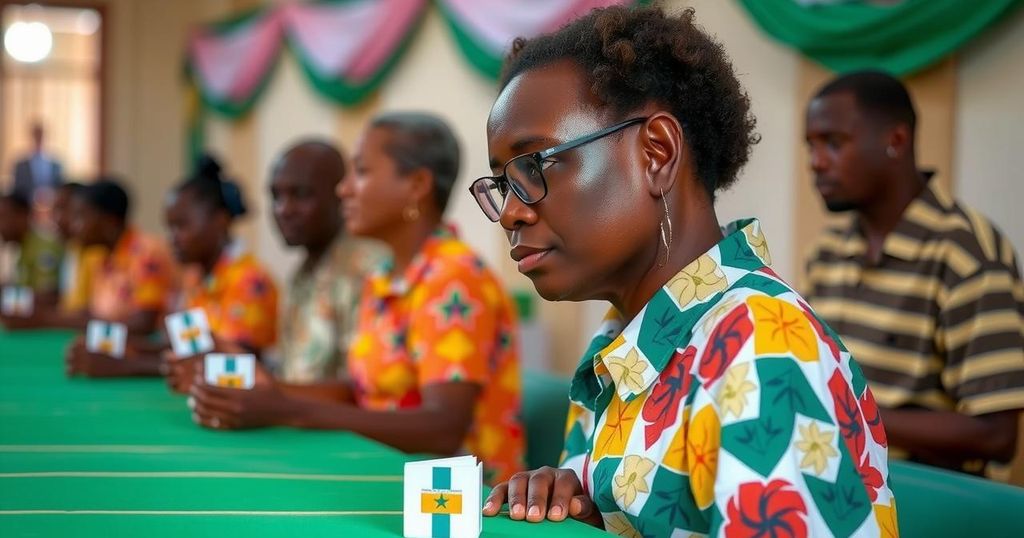Ghana Elections: A Democratic Test Amid Economic Crisis
Ghana’s presidential and legislative elections have opened amid an economic crisis affecting public confidence. Approximately 18.7 million registered voters are facing a two-candidate race between Vice President Bawumia and former President Mahama, who are both pressed to address serious economic challenges. The elections also include 276 parliamentary seats, with an atmosphere rife with optimism mingled with substantial concerns over economic conditions and illegal gold mining.
Polls have opened in Ghana for crucial presidential and legislative elections that are seen as a pivotal test for democracy in a region facing rising extremist violence and political instability. Approximately 18.7 million citizens are registered to vote while the nation confronts one of its most significant economic crises in generations, leaving many voters skeptical about the prospects for change among the main candidates.
Ghana has long been revered as a model of democratic governance in West Africa, historically known for its peaceful electoral processes. However, in recent years, the nation has fallen into turmoil due to rampant inflation, job scarcity, and economic downturns that have eroded public trust. A recent Afrobarometer poll indicated that an overwhelming 82% of Ghanaians believe their country is heading in the wrong direction.
Among the twelve candidates vying for the presidency, the election has coalesced into a two-way contest between Vice President Mahamudu Bawumia of the ruling New Patriotic Party (NPP) and former President John Dramani Mahama of the National Democratic Congress (NDC). The NPP, struggling to maneuver through the economic crisis, faces increasing pressure, while Mahama, who was ousted in 2016, attempts to regain favor with promises of economic revitalization.
The legislative elections will also determine 276 parliamentary representatives, with the NPP and NDC each holding 137 seats in a 275-seat assembly. Throughout their final campaign events, both Bawumia and Mahama sought to portray their political platforms as the viable solutions to Ghana’s pressing economic issues. Bawumia emphasized building upon the progress made during his administration, whereas Mahama proclaimed the need for a comprehensive “reset” across various sectors, including governance and economic stability.
The election atmosphere in Accra has been vibrant, characterized by campaign rallies, election-themed music, and public displays of support. Nonetheless, underlying this enthusiasm is a pervasive anxiety regarding the electoral stakes, particularly considering the dire state of the national economy. Ghana’s default on foreign debt last year and persistent inflation, reaching 54% at the end of that year, amplify the challenges faced by ordinary citizens.
Illegal gold mining, locally termed ‘galamsey’, has emerged as another significant issue, reflecting the desperation of individuals seeking employment opportunities amid economic collapse. Although Ghana remains Africa’s leading gold producer, illegal mining operations have led to environmental degradation, prompting protests and dissatisfaction with government efforts to regulate the industry.
Ghana, once lauded as a beacon of democracy and economic success in West Africa, is currently grappling with an intense economic crisis characterized by soaring inflation and unemployment. The nation is holding presidential and legislative elections against this backdrop, with approximately 18.7 million registered voters. Both primary candidates, Vice President Mahamudu Bawumia and former President John Mahama, face skepticism from the electorate regarding their ability to effect meaningful change. Amid political campaigns, citizens express concerns over the economy and illegal mining practices that have plagued the nation.
The elections in Ghana represent a crucial juncture for the country’s democracy and economic trajectory. Both candidates, Bawumia and Mahama, struggle to present compelling visions that resonate with voters facing economic hardship. As Ghana contends with inflation, unemployment, and environmental degradation from illegal mining activities, the election results will be closely scrutinized as indicators of the nation’s future governance and economic direction. Voter sentiment, steeped in skepticism, will be instrumental in shaping Ghana’s political landscape moving forward.
Original Source: www.voanews.com




Post Comment